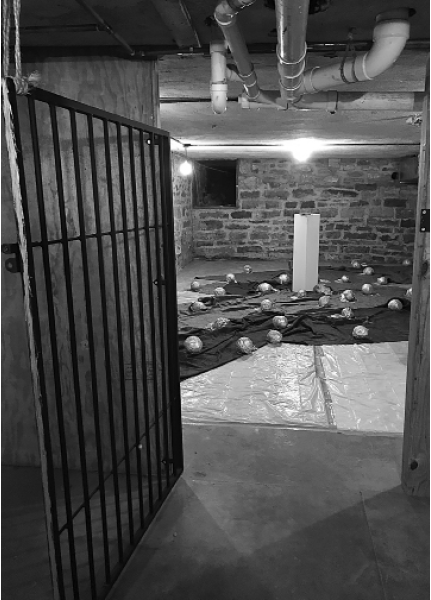
ESPECIALLY CABBAGES, FOR PIERRE BOURDIEU (WHAT TO MAKE OF THE GOLD ONES?)
first performed on December 31, 2017
Historic Stone Cellar, Fayetteville, AR
performed once in 2017
ALISSA WALLS
Fayetteville, AR
alissawalls.com
ESPECIALLY CABBAGES, FOR PIERRE BOURDIEU (WHAT TO MAKE OF THE GOLD ONES?)
ALISSA WALLS
Viewers entered the gallery through a metal gate highlighted in gold enamel and held open by a frayed rope. A stack of green cabbages sat on a pedestal in the corner. Another was centered on a field of gray felt, which displays postcards featuring historical landscapes. During the performance I moved the cabbages individually from the pedestal to a unique site on the felt field, brushing each cabbage with gold pigment. I alternated between painting cabbages and writing on the back of each postcard: “A work of art is an object of popular imagination.” After writing on all the postcards, I painted broad horizontal brushstrokes over the landscape images, turning them upside down, so the landscape face was affixed to the pedestal by paint. Only the phrase remained visible.
This work addressed class and aesthetics through the sociologist Pierre Bourdieu’s work on the construction of taste in Distinction (1984). Bourdieu’s sociological survey suggests that images such as landscapes prove most desirable among the working classes, the least popular being photographs of car crashes. A photograph of a “metal frame” stands among the most attractive to the upper classes, and, “especially cabbages.” This “taste for formal complexity,” Bourdieu argues, reinforces a particular “aesthetic legitimacy.”
My piece points to Bourdieu’s work with absurdist humor, but ultimately there is nothing amusing about it. As he argues, “There is no way out of the game of culture; and one’s only chance of objectifying the true nature of the game is to objectify as fully as possible the very operations which one is obliged to use in order to achieve that objectification.” There is a strangeness in painting green cabbages gold, in their transformation from a historical food of impoverishment to a spiritual mecca wherein one visitor solemnly professed: “This is the Room of the Golden Cabbages.”
With the threat of autocracy today, I wonder about the stability of the rules of the culture game, and whether their fall may be as progressive as those on the left, seeking greater socioeconomic and cultural equality, might desire. What will be gained and lost in such a cultural game change as painting cabbages, deplored by the working class, gold?